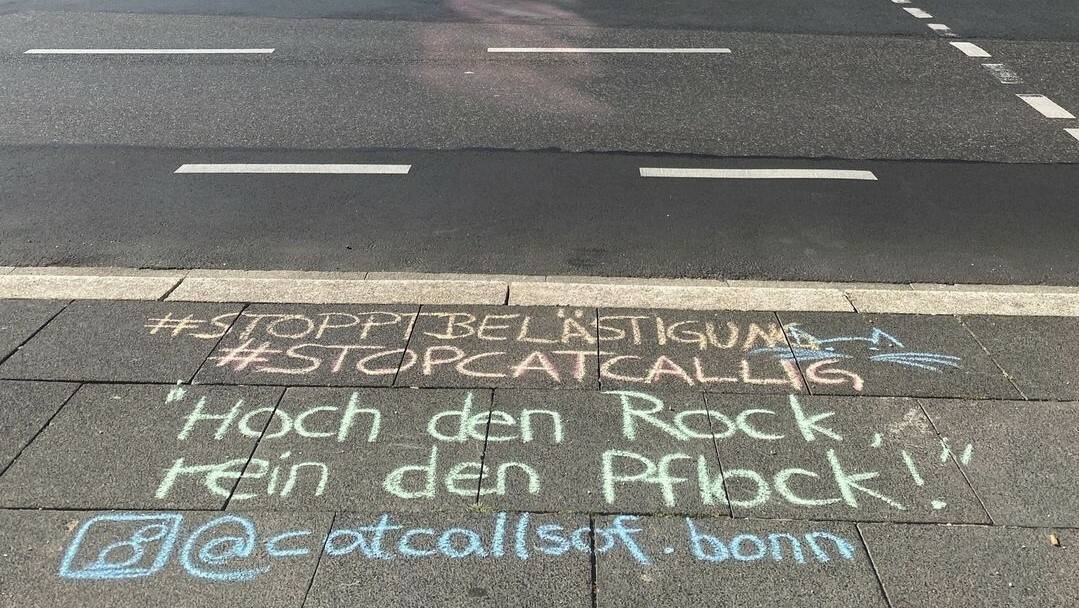Catcalling in Bonn “It’s not the victims who are to blame, but the offenders"
Bonn · Whistling, catcalling and inappropriate sexual innuendos - verbal sexual harassment and so-called catcalling are a permanent problem. The catcallsof.bonn Instagram account has been around for two years now - what has changed?
More than 270 posts and comments have now been documented on the Instagram account catcallsof.bonn since its launch in 2020. "Since the founding two years ago, the number of messages has increased exponentially, but now it has leveled off," reports Franziska Peil, founder of the account. Catcalling is verbal, sexualized violence without physical contact on the street. This includes whistling as someone walks past or making insinuating remarks, often referring to the body or appearance of the victims. Franziska Peil and her fellow activists write down the catcall remarks in chalk on the pavement to draw public attention to catcalling.
Since 2020, so many local groups and accounts have been founded that the “catcallsof” initiative now has the most local groups worldwide, with 120 cities throughout Germany included. "The topic is much more broadly positioned in the media today. Many more people now know the term catcalling," said the Bonn resident. As of this year, “catcallsof” groups are also a registered association. "This is a very big step for us. Since we all do it on a voluntary basis, it was a lot of work for us," says the founder.
Due to the high profile of the local group in Bonn, it regularly collaborates with other activist groups and associations such as women's groups. "The issue has arrived in Bonn. People know us. We give lectures and do workshops and exhibitions," Peil explains. In the near future, the founder would like to see more dialogue with Bonn's local politicians. "What we could also imagine are workshops at schools on the topic of catcalling," she says.
Her colleague Sarah Götze has been active for the Instagram account since May of this year. She also feels that there is now more talk about verbal sexualized violence and catcalling, but that it is not nearly enough. "The phenomenon of catcalling itself is not new, rather the way society deals with the issue. But there were and still are offenders, and not much has changed," she says.
Increased demand at the counseling center against sexualized violence
For a good year now, Conny Schulte has had more to do in her work as managing director of the counseling center against sexualized violence in Bonn. She says that more and more victims are coming to her. Catcalling and verbal sexualized violence, however, are not distinguished from other sexualized acts. "We don't have statistics about what happened to people. That's hard to pin down," Schulte says. Like Götze and Peil, she notices that the issue of verbal sexualized violence is getting more publicity and the public debate is different than it was two or three years ago. It is important that the acts are recognized and taken seriously. Sexualized violence is still a taboo subject, Schulte says. "It's not the victim's fault, it's the offender's fault. It's not appropriate to ask the victim why they didn't behave differently," she stresses.
Bystanders could get involved in situations, but should not put themselves in danger. Michael Beyer, spokesman for the Bonn police, agrees. For the police, he said, it is difficult to identify the offenders because verbal harassment often happens in a public context and catcalling is not a criminal offense. "We can't filter whether it was an insult or sexual harassment. If charges were filed for insult, it always depends on the case," Beyer says. "I would always advise calling the police if you don't feel safe," he says. When in doubt, he says, 110 is the right number. Victims can also approach passers-by on the street and ask for help.
Chalking makes it more visible
What Peil, Götze and the team from catcallsof.bonn are doing on the Instagram account is something Conny Schulte from the counseling center against sexualized violence thinks is good. "The chalking shows that harassment happens and happens in public space," she says. "The more people talk about it, the more visible the issue becomes."
The account gets messages sent around the clock. Goetze estimates that more messages come in the summer than in the winter. "Even though clothes don't matter and victims are never blamed, in summer there are a lot of comments targeting short summer clothes," she says. She estimates the number of messages in summer to be between five and ten per day; currently, she says, there are around three messages that flutter into the inbox per day.
Catcalling is in no way a misunderstood compliment, Götze says. "If this form of sexualized violence is perceived as okay and normal, it is very difficult to recognize other boundaries than this," she continues. Götze does not want to name specific places that have been particularly affected. "Our chalkings are not representative statistics and we want to give the space back to those affected by verbal sexual violence through this." She hopes to raise awareness and help those affected through her activism.
VERBAL SEXUALIZED VIOLENCE
Offers of help
The city of Bonn has set up various services to counsel and support victims of verbal sexualized violence. Those affected can contact the counseling center against sexualized violence. The counseling center can be reached at 0228 63 55 24. Victims can find more information on the website beratung-bonn.de. The Bonn police also offer assistance. The violence against women hotline is: 08000 116 016. Victims can contact the counseling center anonymously 24 hours a day, seven days a week, including via chat. In addition, victims can say "Luisa" (code word) at the bar in many pubs in Bonn and they will be helped.
Orig. text: Maike Velden - Translation: ck




